Earth Song Book Club
After years of reading poetry, Seamus Heaney’s The Rain Stick is still my favorite. I could read the poem over and over, and that’s just what the verses are about: giving attention, receiving, giving attention again and retrieving more depth and nuance than we suspected on the first shake-down of “grit and dried seeds” cascading their different-same paths through the hidden rickets of a polished wood cylinder.
“Upend the rain stick.”
“Listen now again.”
Heaney urges something our fast-paced lives don’t know the meaning of. Lynda Barry, in her intensely creative, attentive book Making Comics, says something similar:
“Part of our work is to take time, to wait like any bird-watcher, to hold still and be taken in.” And, “You will have to be quiet.”
I think both nature and poetry call us to this way of living: you will have to be still if you want to deeply engage with life, if you want to truly be part of the natural world, if you want to know any poem – if you want to, as Heaney says, “enter heaven through the ear of a raindrop.”
This is a gift poetry gives us: both the reason and the imperative to set our loud, unlistening ways aside for a minute or an hour or however long. This is a particular gift of the poetry collection named Earth Song, which was editorially composed to read like a symphony, each poem leaning against the prior and the next and playing variations on themes that strike a series of chords leading you into a rainstick experience.
“You stand there like a pipe
being played by water.”
If this were my Tenth Grade Language Arts class, and you were my students, I would issue an imperative: Read each poem at least twice.
I try to tell those fifteen-year-olds, bright-eyed as they carry themselves in general, skeptical as they tend to be about poetry in particular, “Always read a poem twice—once to get the big, symphonic picture, and again to catch the subtler pitching of note against note.”
(By the time our class arrives at Ezra Pound’s incredibly brief, imagist In a Station of the Metro, it’s fun to tell the kids they’re going to have a tough time getting through this one twice, but see if they can do it. They approach their homework with great trepidation that evening and laugh the next day; Mrs. Martin really got them this time.)
No imperatives in this book club, but a suggestion: if you’re able, read the whole book through before our first meeting on Wednesday, September 7th. You’ll have sat through an entire first performance of the symphony, your own copy of Earth Song’s opening night. You’ll be ready each week of September to upend the rain stick a second time for a handful of the poems.
Of course, if you’re not able, come as you are, receiving each assigned poem for the first time. There’s beauty in that, too. The neat thing about a poem-centric book group is that you can dip in and out as needed and still experience a number of poems that can stand on their own.
One last thing: Does it feel strange to read nature poems in (depending where you live) the final full flush of summer or the “shining from shook foil” as fall blazes in?
I normally seek out my favorite nature writing (Annie Dillard, Wendell Berry, Noel Perrin) at the equinox round the other side of the earth’s annual bend, the smell of turned soil and sight of nest-building birds waking me up to the growing life around me.
Autumn holds its own natural glories, though, doesn’t it? So let’s meet in September, on the cusp of the year’s waning as the earth readies itself to wait—an active, anticipatory sort of rest, ourselves ready to hear the notes editor Sara Barkat has so aptly chosen to lead us along, learning better to love this earth we live on in any of its seasons.
Questions Before We Begin
What poem or poet comes to mind when you think of “nature poems”?
Are there any nature poems you already know well and return to, in particular?
Answer in the comments. I’ll share my own answer there, too.
Join us in September for a special book club discussion of this collection. Become a Patron to Join This Club.

Buy Earth Song
Reading Schedule
Week I / September 7th p. 13-41 (“From the Editor” through “The Woodpile”)
Week II / September 14th p. 42-66 (“Tornado Warning/Joann Fabric & Craft” through “Scent”)
Week III / September 21st p. 67-95 (“I Pity the Garden” through “Home and the Homeless”)
Week IV / September 28th p. 96-126 (“The Oak Desk” through “The morning sea of silence broke into ripples of bird songs”)
Photo by Ray in Manila, Creative Commons license Via Flickr. Post by Rebecca D. Martin.
- Earth Song Book Club: Poems in the Silence - September 28, 2022
- Earth Song Book Club: Garden Poems - September 21, 2022
- Earth Song Book Club: Force of Nature - September 14, 2022


Rebecca D. Martin says
When I’ve thought of nature poetry in the past, Mary Oliver has always come quickly to mind. Specifically, her poem “Messenger,” which begins:
“My work is loving the world.
Here the sunflowers, there the hummingbird—
equal seekers of sweetness.
Here the quickening yeast; there the blue plums.
Here the clam deep in the speckled sand.”
And, of course, I return to “The Rain Stick” again and again – just like the poem tells me to. 🙂
One thing I appreciate about Sara Barkat’s selections in _Earth Song_ is the breadth of nature poetry she’s gathered – authors across cultures and eras. The next time I’m asked what nature poems and poets come to mind, I’ll have a deep, deep well to draw from.
L.L. Barkat says
Wouldn’t it be wonderful if everyone found that at least part of their work was to “lov[e] the world”? I’ll tell Sara what you appreciate about the collection. And I do know she intended it to reflect and inspire a love of the world.
Susi Forshey says
Robert Frost’s poem, “October” is sooo choice. I read it every year at that time. I feel like I must have written it before in my heart before I ever even read it. Perhaps the earth herself wrote it.
Sometimes G.K. Chesterton gets poetic about nature, too. I like to read him aloud. As if I’m convincing myself.
Rebecca D. Martin says
Oh, Susi, thank you for introducing me to Frost’s October. It is enchanting!
I’d love some GKC poem recommendations, and appreciate how you say, “As if I’m convincing myself.”
Laura Lynn Brown says
Poets: Mary Oliver, Wordsworth, Seamus Heaney, to some extent William Stafford, W.S. Merwin … There’s a lot of nature in Emily Dickinson and Robert Frost’s work. The early haiku masters.
Poems: Dana Gioia’s “Words”; Dickinson’s narrow fellow in the grass; so many Mary Oliver poems; William Stafford’s poems about the river (“Ask Me”) and moving a dead deer (“Traveling Through the Dark”)> Brenda Hillman’s “Small Spaces.” I know I’ll think of others later.
Rebecca D. Martin says
Laura, you’ve given me a host of poems to ferret out and read or reread. Dickinson’s narrow fellow in the grass has wound his way into the Earth Song collection, alongside “Snake” by D.H. Lawrence, which is really wonderful in a different way (and chastening). Glad you mentioned early haiku. So easy to think in Western terms, but that pure, old mode of distillation: yes.